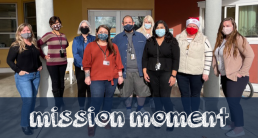As COTS’ CEO, each month I take a moment to consider what I want our community to know about our organization and our progress in serving Sonoma County’s homeless. I look forward to sharing these thoughts with you in this Virtual Cup of Coffee – my monthly communique about the business and mission moments of COTS (Committee On The Shelterless).
Please stay safe,
Chuck

Our case management team, from left to right: Debbie Robbins, Housing Case Manager & Case Management Trainer; Carmen Razo-Clark, Housing Case Manager; Kathleen Sinnott, Housing Case Manager; Julia Dodge, Supportive Programs Case Manager; Chris Inclan, Shelter Case Manager; Christina Madden, Shelter Case Manager & Recovery Specialist; Angeles Cruz, Shelter Case Manager; Wendy Lindberg, Shelter Case Manager; and Sarah Vetter, Homelessness Prevention Case Manager. Not pictured: Eileen Morris, Client Enrichment Manager.
Holding the Hope for Others
Ever wonder what case management means or what a case manager does? We often use this term in the non-profit and social services world. Because we don’t make stuff like computer chips, phones, or say fruitcake (well…it is the holidays and the favorite of many), case management is our lifeblood. Great case managers can determine how successful we are in helping those experiencing homelessness, how innovative we can be with impactful services and programs, and how well we connect on a human level.
Here’s what you’ll learn if you Google case managers: “They are social service workers who coordinate care for their clients; perform interviews and assessments to learn a client’s needs and then together, create a plan to work on their challenges or connect them with needed services. As the client receives services, case managers will monitor the client’s progress and may work with other service providers as needed to address the client’s needs.” Unlike social workers, case mangers do not provide therapy, though they may provide counseling to clients. They usually have a Bachelor’s degree in psychology, criminal justice, or sociology, and some may have a Master’s degree. They often have training, have taken specialty classes, or are certified in addiction, substance abuse, or drug and alcohol counseling.
Key strengths in good case managers are skills like communication…especially listening, interviewing and critical thinking, negotiation and collaboration, knowing your boundaries, advocacy, teaching, involving the clients in making decisions that impact their lives (choice and self-determination), respect for cultural diversity, and quality of care.
I sat down with COTS case manager Chris Inclan and he shared with me what he does. And honestly, Chris does and has all of the above skills…and so much more. And if I sat with our other case managers at COTS – Angeles, Carmen, Christina, Debbie, Eileen, Julia, Kathleen, Sarah, and Wendy – they too would have all of the above skills…and so much more.
Chris said case management is about supporting clients to live their best lives. To push people beyond what they think they can do. To meet clients where they are. To give a different perspective on how best to look at issues – alternatives. Often, clients feel disconnected and have lost all hope. Chris helps to show them opportunities. He helps them with using technology as many don’t know how to navigate online help. He helps them build skills so they can feel empowered and independent. He helps them to be in the present moment, to appreciate the beauty of what’s around them, and what all of that can teach them. He helps them to be grateful that they have food in their stomachs and a roof over their head.
Chris started a mindfulness and self-esteem group at COTS to help clients deal with the pain they are realizing, to try and not be the victim, and to look inward as a locus of control and not rely on the external world.
Our clients at COTS are the beneficiaries of numerous innovative programs and services provided by our case managers. Julia, Christina, and Eileen started various recovery maintenance and life skills groups. All of our wonderful case managers hold the hope for our clients until they can hold the hope for themselves. They care, are compassionate, and are committed advocates for their clients. If I were a client at the Mary Isaak Center and needed case management, I would be in very good hands with each one of our case managers.
Someone defined a case manager as a person who solves problems you never knew existed in ways that will blow your mind. A Miracle Worker or Superhero. Yep, that defines all of our case managers at COTS.

Until next month,

Chuck Fernandez